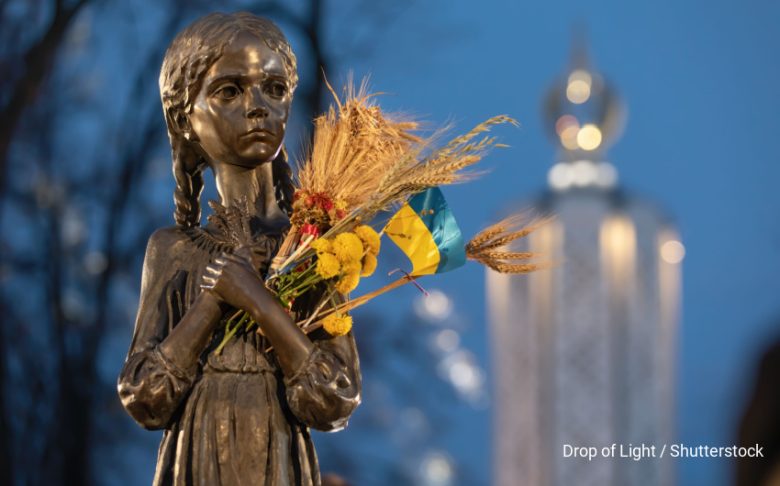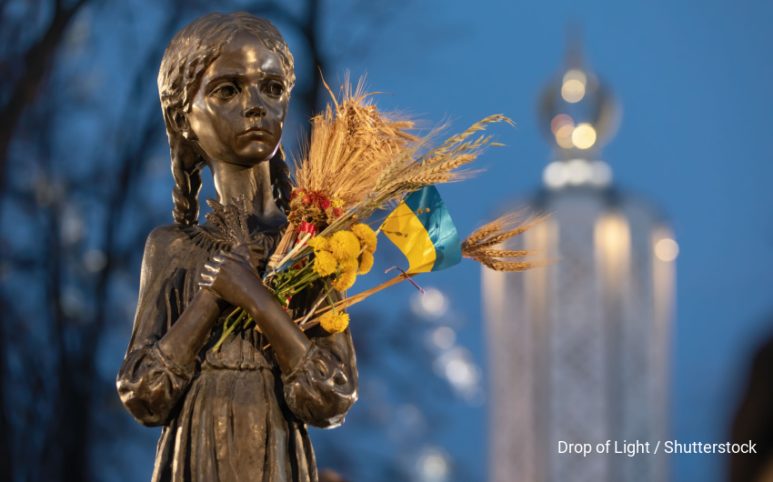By Dina Newman
This year marked the 90th anniversary of mass starvation unleashed by Stalin and his government on peasants in Ukraine, parts of Russia and Kazakhstan. In total, an estimated seven million people died from man-made hunger across the Soviet Union in 1932-1933. In Ukraine, this tragedy is considered a Soviet genocide against Ukrainian people and is called Holodomor in Ukrainian. In Kazakhstan, some historians argue for it to be recognised as a genocide against Kazakh people. In Russia, Stalin’s murderous policies are not discussed in the official media, but the opposition media mostly agree that Holodomor was an act of genocide. For those inside Russia, this position carries a risk. Some opposition activists who have researched Soviet mass killings are now in prison on trumped up charges.
Ukrainian Holodomor commemorations carry a particular political weight this year, in the context of Russia’s brutal attack on Ukraine. Last week, the European Parliament showed solidarity for Ukraine by recognising Holodomor as a genocide.

Germany and some other countries, including Australia, Poland, United States, Canada and the Baltic states now also recognise Holodomor a genocide. In their media interviews, German parliamentarians describe their decision as political, a “warning” to President Putin.
What does this debate mean for Russia and Ukraine?
Recent European parliamentary resolutions use the memory of Holodomor for political purposes – but politics has also been the main motive for Holodomor denialists. Over the decades, the Soviet propaganda machine and its fellow-travellers in the West have published a number of books either denying the mass hunger altogether, or attributing it to “mistakes by local authorities”.
While the Soviet state wanted to avoid any responsibility for its crimes, some Communist sympathisers in the West have been reluctant to admit that Stalin’s regime aimed to exterminate an ethnic group before Nazi Germany used the same tactic “to solve the Jewish question”.
A more nuanced argument comes from those commentators who are focussed on history and are not driven by a political agenda. They see Holodomor as a deliberate mass murder targeting a class, rather than an ethnic group. More specifically, they argue, it was a policy to punish well-to-do peasants who refused to give up their property and join collective farms. This argument fits in with the Bolshevik policy of “class war” and “the extermination of the enemy classes” as part of the “dictatorship of the proletariat”. In this context, they argue, the term “genocide” is not appropriate. They suggest a special term for class extermination: “stratocide”. A “stratocide” is as much of a crime against humanity as a “genocide”.
A key proponent of this approach is Tomas Venclova, a poet and a prominent Lithuanian intellectual. In a recent interview he explains the difference between a “genocide” and a “stratocide”, suggesting that the current Moscow tactics in Ukraine are closer to a genocide, while the term “stratocide” is the best to describe Stalin’s man-made hunger.
In Ukraine, which is defending itself from a brutal Russian attack, the media coverage links Holodomor directly with Putin’s war against Ukraine. A respected newspaper, Kyiv Post, carries a typical headline: “Russia again conducts genocide in Ukraine”.
In Russia, official commentators stick to the tried-and-tested trick of denial.
Russian opposition commentators tend to accept the description of Holodomor as a genocide, because they see supporting Ukraine as a priority over debating terminology.
In his latest interview to an opposition Youtube channel, a popular commentator Vladimir Pastukhov, offers the following approach:
“We can interpret “a genocide” as a broad concept, or as a narrow concept. If it means, broadly, an inhumane totalitarian practice of killing people, then events in Ukraine in 1930s are a genocide. It was an inhumane, deliberate practice of starving millions of people to death. If we take the narrow concept, eliminating all members of an ethnic group, then perhaps, Holodomor is different from “the final solution” which we know from the Holocaust.”
In the end, Pastukhov concludes, it is crucially important to condemn Holodomor internationally, and to support Ukraine politically in its fight against Russia. Precise definitions, in his view, are less important at this stage.
Political support for Ukraine matters right now. Selecting a special term for killing classes of people may be an important step forward in condemning the whole of the Soviet regime with its “class war” tactics as criminal. Perhaps this is the goal for historians in the future. Ultimately it will be up to East Europeans, including Ukrainians, Lithuanians and all nations and ethnic groups who have suffered from the crimes of the Soviet leadership, to reflect on their own history and come up with the terminology which best describes their collective experience.
Photo Credit: Drop of Light / Shutterstock

